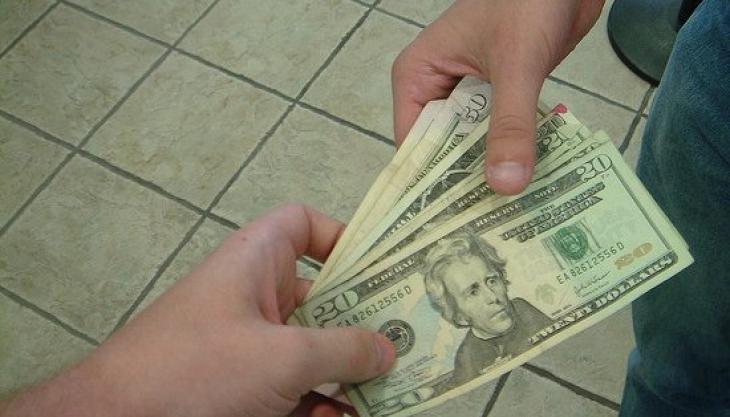How Much Unsecured Debt Is Too Much? One Year’s Income
Submitted by Rachel R on Mon, 01/15/2018 - 8:47am

How much debt can you afford?
Image by Quazie via Flickr
Consumer debt is growing now like we haven’t seen since just before the Great Recession. Credit card household debt just topped $905 billion which is an 8% increase over the previous year. This is considered unsecured debt because it isn’t tied to collateral. There seem to be no signs of stopping this trend and North Carolina households with debt now owe an average of $131,431 including a mortgage. If you can afford the debt you’ve accrued, that’s okay. But if not, you might be facing a financial crisis in your future. Here’s a look at how much unsecured debt is too much and what to do if you’re drowning in bills you can’t pay.
Debt Growing Faster Than Income
While consumer confidence and a healthy economy always bolster spending and credit card debt, if you can’t afford what you’ve charged, it can be problematic. Further complicating the situation is that the debt increase is outpacing income growth. Over the past decade, income growth has averaged 20% while medical expenses rose by 34% and food costs by 22%. It’s not just what you charge that matters because interest is also a factor. Each household that carries credit card debt month to month pays almost $1000 in interest annually.
What’s Your Debt to Income Ratio?
One way to measure if your debt situation could be a hindrance is by calculating your debt to income ratio. This is essentially how much your monthly debt is as a proportion of your income. To calculate, start by adding up your monthly payments that are not living expenses. This includes mortgage or rent, alimony/child support, student loans, auto loans, other secured debt, and minimum credit card payments. Divide this number by your monthly income before taxes (i.e., your gross income).
The lower your DTI (debt to income ratio), the more stable your finances, and the less risky you are to potential lenders if you apply for a loan. If you have a debt to income ratio higher than 43%, you likely won’t be approved for a mortgage. Many financial advisors will tell you that a debt to income ratio greater than 28% is a warning sign that you’re carrying excessive debt. Too much unsecured debt is part of this equation. Here are some warning signs that your unsecured debt is too high:
1 – You can’t pay off credit card debt and medical bills in a year
Your unsecured debt may be a cause for concern if you can’t pay off your credit cards and medical debt within a year on your current income. If your debt exceeds this amount, it’s worth looking at your budget to see if you can cut costs to accelerate paying off your card balances and medical bills.
2 – You must use credit cards to pay for essentials like gas and food
If you use credit cards to pay for gas and groceries then pay off the balances at month end, that’s common and not typically an issue. But if you can’t afford necessities unless you charge them, and you carry balances over month to month, that’s a red flag of an impending unsecured debt dilemma.
3 – You can only afford minimum payments
For those that can only pay the minimums on your credit card debt, it’s a warning sign. Paying just the minimum means you are not touching the principal and that means interest charges. If your minimum payments don’t cover the interest, then you’ll be paying interest on top of interest.
How North Carolina Bankruptcy Helps
Sometimes, you can battle it out and regain control of your debt. But in other cases, you might be better served by filing bankruptcy to get a clean slate. With Chapter 7 bankruptcy, unsecured debt like credit cards and medical bills are discharged in full within just a few months. With Chapter 13 bankruptcy, you get on a repayment plan to catch up past-due secured debt like your home and auto loan while also paying less on unsecured debt, sometimes as little as pennies on the dollar.
To find out more about shedding excessive credit card debt using bankruptcy, contact the Law Offices of John T. Orcutt. Read reviews from satisfied clients and then call +1-833-627-0115 now to schedule a free North Carolina bankruptcy consultation at one of our convenient locations in Raleigh, Durham, Fayetteville, Wilson, Greensboro or Wilmington.
Resources:
Debts Hurt! Got debt? Need help? Get started below!
Serving All of North Carolina
- Bankruptcy Attorneys Raleigh NC (North)
- Bankruptcy Attorney Fayetteville NC
- Bankruptcy Attorney Durham NC
- Bankruptcy Attorneys Wilson NC
- Bankruptcy Attorneys Greensboro NC
- Bankruptcy Attorneys Southport NC
- Bankruptcy Attorneys Wilmington NC
Bankruptcy Attorneys Raleigh NC (North)
6616 Six Forks Rd #203 Raleigh, NC 27615 North Carolina
Tel: (919) 847-9750

Bankruptcy Attorney Fayetteville NC
2711 Breezewood Ave Fayetteville, NC 28303 North Carolina
Tel: (910) 323-2972

Bankruptcy Attorney Durham NC
1738 Hillandale Rd Suite D Durham, NC 27705 North Carolina
Tel: (919) 286-1695


Bankruptcy Attorneys Greensboro NC
2100 W Cornwallis Dr. STE O Greensboro, NC 27408 North Carolina
Tel: (336) 542-5993

Bankruptcy Attorneys Southport NC
116 N Howe St. Suite A Southport, NC 28461 North Carolina
Tel: (910) 218-8682

Bankruptcy Attorneys Wilmington NC
116 N. Howe Street, Suite A Southport, NC 28461 North Carolina
Tel: (910) 447-2987
